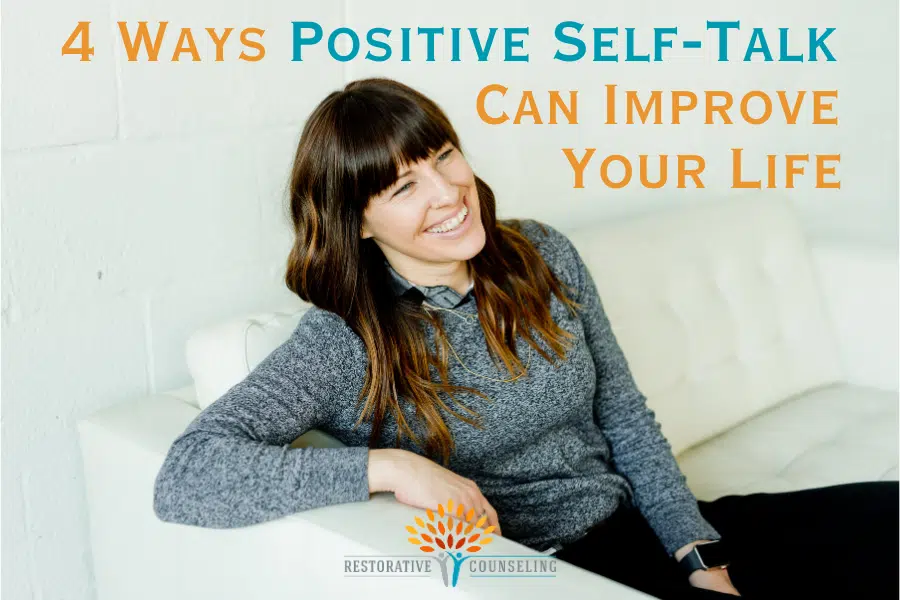Written by Katie Jackson-Griffin, LCPC
Your inner voice can be your ally or your foe. The tone of your self-talk can be the difference between taking steps to improve your life or remaining stuck in a cycle of inaction. Although your inner voice does not make decisions for you, it can significantly influence what you do (or do not do).
If left unchecked, the voice inside your mind can wreak havoc on how you feel about yourself. It can hold you back from achieving goals, meeting deadlines, and feeling secure in who you are.
However, once you realize the power you have over your self-talk, you will see how you can embrace it to better yourself. That voice can motivate you to work through conflict, manage your daily tasks, and build a foundation of self-worth. Here are 4 ways that positive self-talk can improve your life.
How can positive self-talk change your life?
1. Your inner voice can encourage you to push past fear and anxiety to strive toward completing a goal.
When your inner voice shifts from being negative to positive, it reduces anxiety, depression, and a slew of other difficult emotional states. It can also increase your motivation. Self-compassion can be much more encouraging than criticism. Why would you want to keep trying if you are putting yourself down and thinking that you can’t do something? Instead, work to shift your thinking to what you can do. Focusing on what strengths you have instead of your limitations can allow you to achieve your goals.
2. Positive self-talk can be used to remind yourself that you can tolerate the discomfort of uncertainty.
It can be tempting to want to try and predict the future. Additionally, it can be daunting and scary to think about hardship that might occur. In these instances of uncertainty, people sometimes try to avoid or consider all the reasons why the hardship “can’t happen.” This only serves to escalate anxiety and depressive symptoms. Instead, keeping your thoughts neutral can remind you that you can handle whatever comes. For example, it can make a big difference to shift your thoughts from “This can’t happen,” “I can’t do this,” or “How will I ever figure this out?” to “I’m scared and I can tolerate this,” “I’m worried and I can cope with whatever happens,” or “I will problem solve for that issue if it comes up.” Learning to tolerate uncertainty can provide you with a lot comfort and peace.
3. Positive self-talk boosts your self-confidence.
As you become more aware of the impact of your self-talk, you can start to consciously choose how you speak to yourself. A useful strategy can be to assess if the way you are talking to yourself is the way you would talk to a friend. Often, people are very harsh toward themselves, but would never speak that way to others. You likely would want to motivate and encourage a friend. So why not talk to yourself that way? You deserve compassion too! Your confidence can grow by reducing this type of cognitive distortion referred to as “mental filtering.” Mental filtering is when you only focus on the negative aspects of yourself and ignore the positive attributes you possess. Taking a more balanced approach by emphasizing the positive can improve your confidence as you remember your strengths and abilities, despite your challenges.
4. Reframing your self-talk helps create healthier beliefs about yourself.
It is nearly impossible to simply will yourself to believe something you do not. You need to reframe your self-talk to be believable, not just more positive. It is critical that you are honest with yourself. For example, after being rejected on a date, instead of thinking you are unlovable, think about all the great traits you have to offer a person you are more compatible with. It is okay to acknowledge the disappointment and hurt you feel. These feelings are valid. However, when you assign value to yourself, such as believing you are “unlovable,” this doesn’t give you a chance to focus on things that are within your control. Focusing on the facts can allow you to create more compassionate and healthy beliefs about yourself.
The team at Restorative Counseling can help you shift from negative to positive self-talk.
Ultimately, healthy and constructive self-talk can lead to both immediate and long-term benefits. We are here to help you build awareness about negative self-talk and to challenge and replace unhelpful beliefs about yourself. Thus, you can feel better and more focused on what you want to achieve. Contact Restorative Counseling today to get started.

Hi, I’m Katie!
I use HAES and DBT approaches to help people overcome their challenges with low self-esteem, anxiety, and depression. Read more about me.
Follow Restorative Counseling
Sign up for our newsletter

